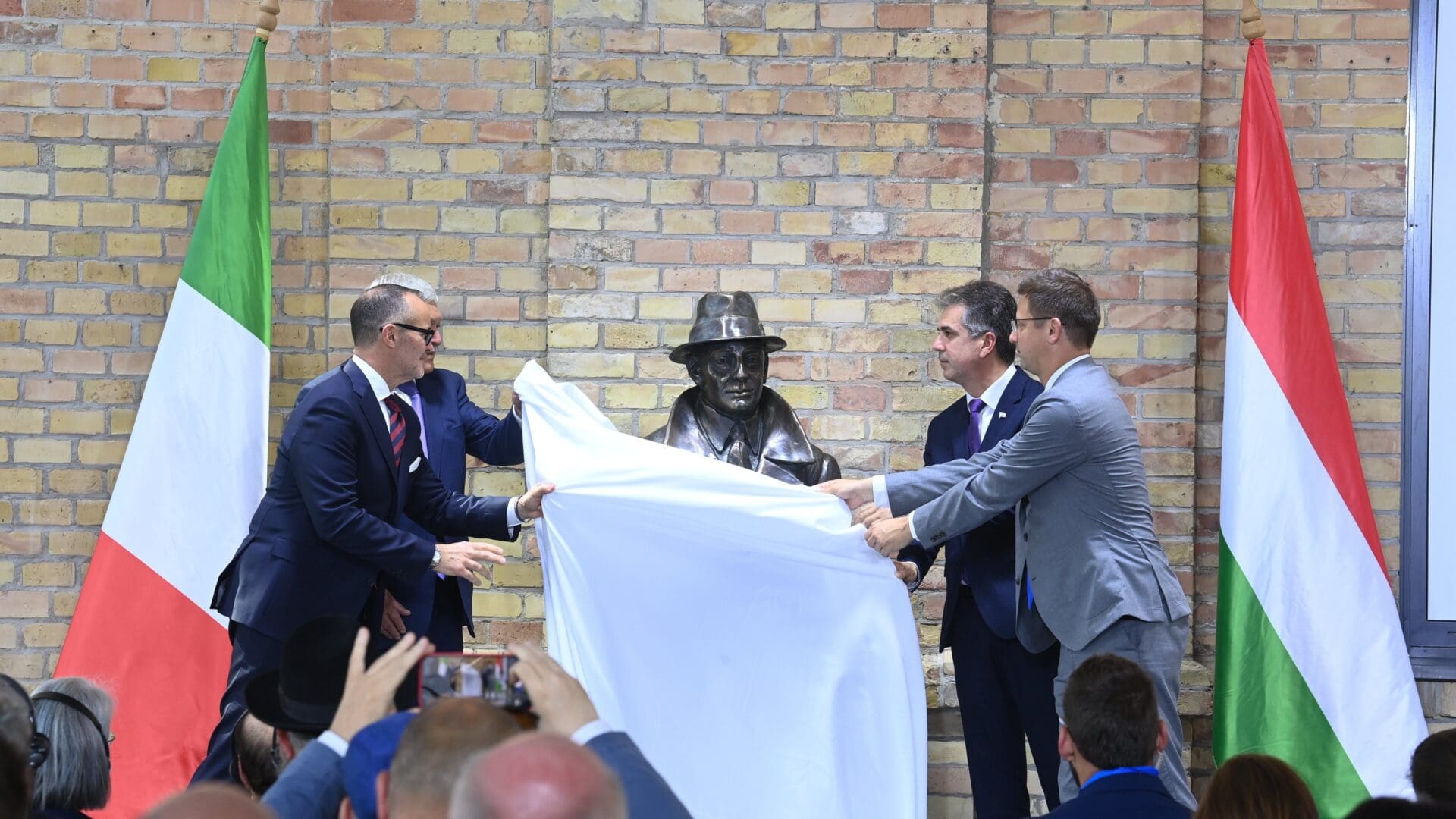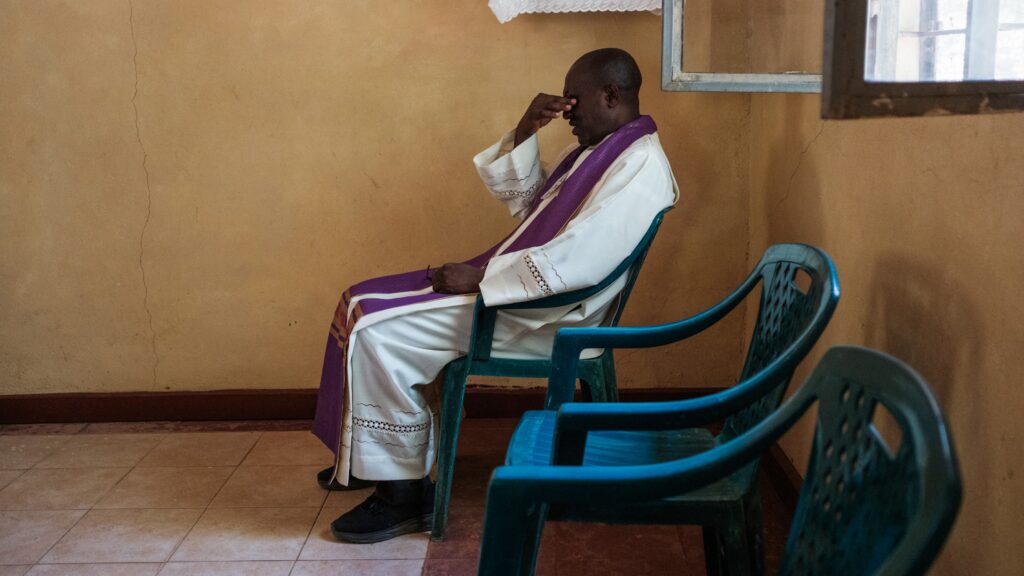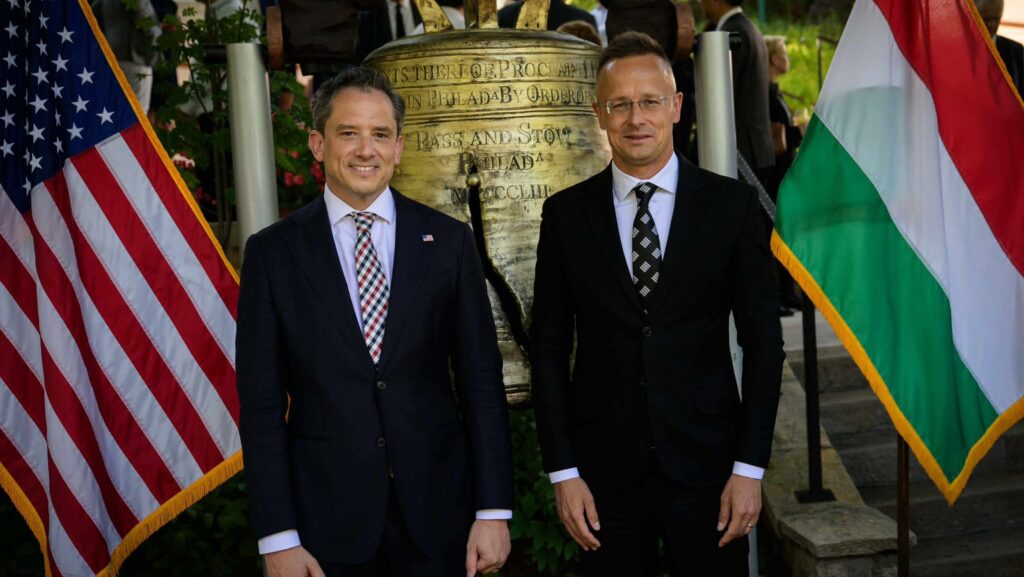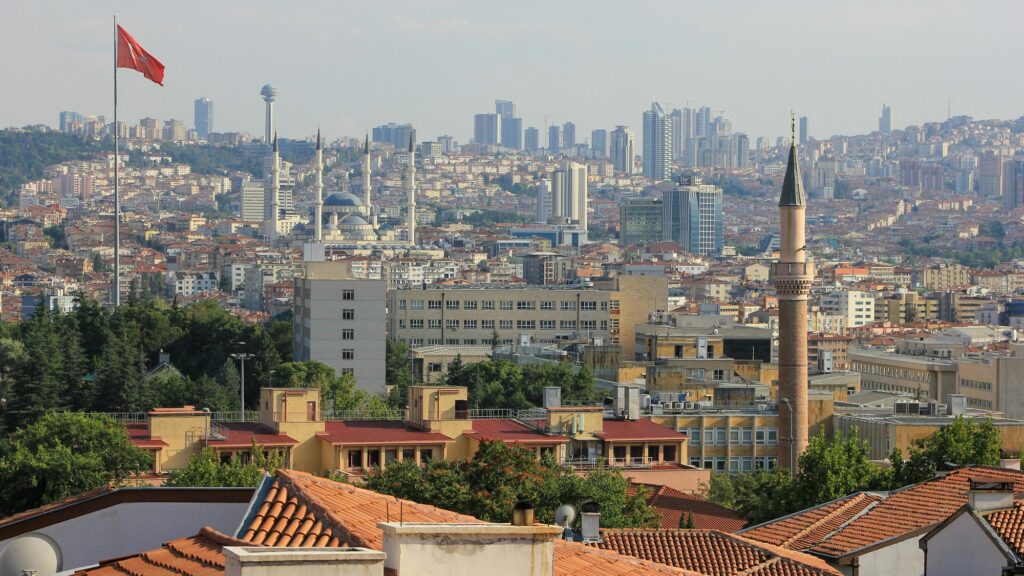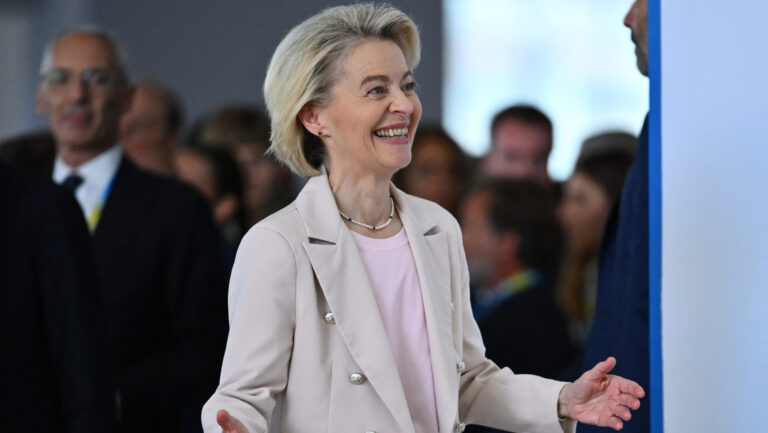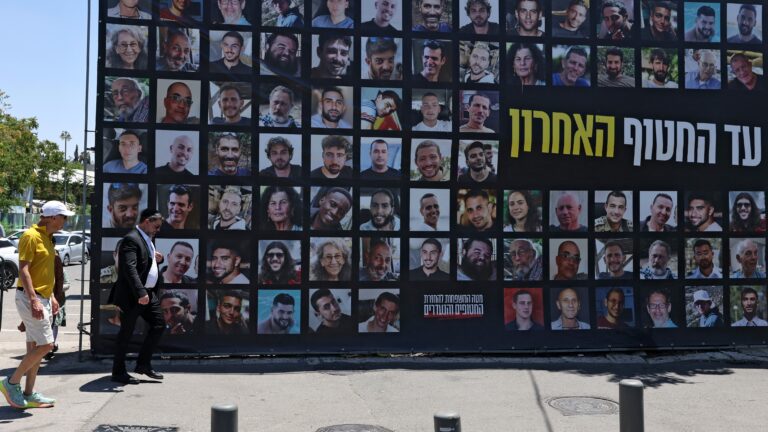Israeli Foreign Minister Eli Cohen visited Budapest on 30–31 May as part of his diplomatic tour in Central Europe, during which, besides Hungary, he visited Croatia, Austria and Slovakia. As Cohen explained, the tour aimed to strengthen Israel’s strategic cooperation with its friends and create opportunities to advance its diplomatic and economic interests on the continent. During his visit to Budapest, the Israeli Foreign Minister met with his Hungarian counterpart, Péter Szijjártó, Hungarian President Katalin Novák and with leaders and representatives of Jewish communities.
On 30 May, the Israeli Foreign Minister visited the Óbuda Synagogue to meet with leaders of EMIH, the Association of United Hungarian Jewish Congregations and MAOIH, the Hungarian Autonomous Orthodox Jewish Community. At the beginning of the meeting, the chief rabbi of EMIH, Slomó Köves, showed the Israeli Foreign Minister around the 200-year-old synagogue and had a private discussion about current issues affecting Hungarian Jewry. During the meeting, the Foreign Minister said that Hungary is one of Israel’s closest allies in the European Union and highlighted that Israel has excellent diplomatic and economic relations with Hungary. The Israeli Minister also emphasised Israel’s commitment to the welfare and safety of the Jewish communities in the diaspora which is why he considered it important to meet with the Jewish diaspora communities on his diplomatic trips.
On 31 May, Minister Cohen had a meeting with the Hungarian Minister of Foreign Affairs, Péter Szijjártó, who highlighted the historic nature of the visit. As he noted, ‘now we have the honour of displaying the flag of Israel in this ministry for the first time after 13 years’. Minister Szijjártó highlighted that Hungary considers Israel a strategic partner, friend and ally. He also declared that ‘Israel can count on the Hungarian government when it comes to countering the biased, unbalanced and unfair treatment of Israel by international organisations, and we recognise the Jewish State’s right to protect itself and fight against terrorism which endangers the safety and security of its citizens.’ Eli Cohen expressed his gratitude for Hungary’s support for his country in the international community and its consistent support for Israel as a friend. ‘I would also like to thank the Hungarian government for its zero tolerance towards anti-Semitism. We appreciate this very much and thank you very much for your attitude towards the Jewish community,’ he said.
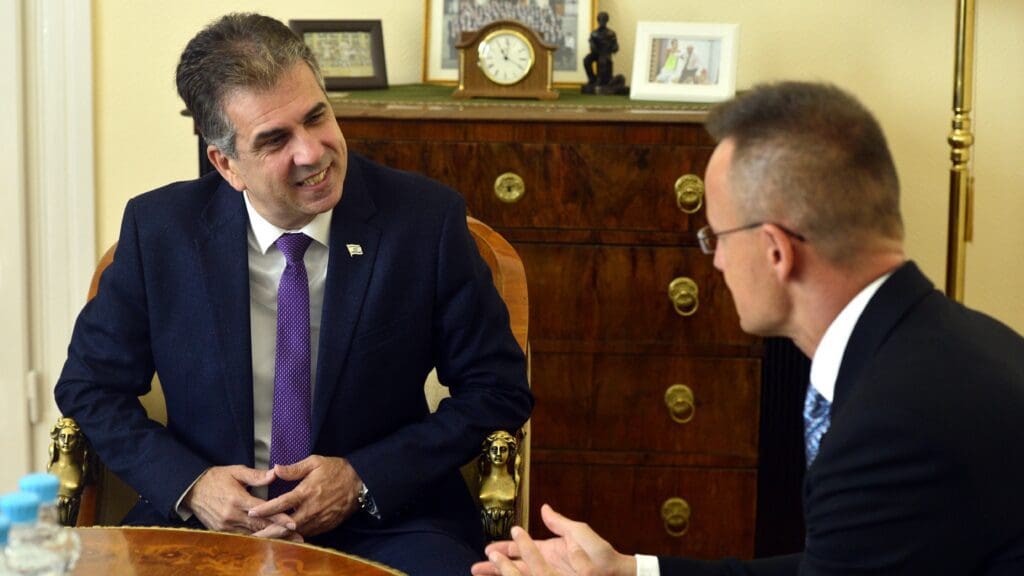
The meeting was followed by the signing of a memorandum of understanding, broadcast live, between the Ministry of Foreign Affairs and Trade of Hungary and the Ministry of Foreign Affairs of the State of Israel on cooperation within the framework of the Stipendium Hungaricum Programme for the year 2024–2026, according to which each year Hungary will grant 50 scholarships to Israeli students.
EU’s Financial Support to the Palestinian Authority Sponsors Terrorism
As Hungarian Conservative also reported, Péter Szijjártó highlighted at the joint press conference that followed the meeting that an anti-Israel political stance is present in Western Europe, which is why in recent times, Hungary has had to veto several joint European positions that were clearly biased, unfair, unbalanced, and unjust towards Israel. Szijjártó also strongly condemned all the terrorist threats and attacks that Israel has had to face in recent times and
deemed it unacceptable that Palestinian organisations associated with terrorist groups could receive financial support from the European Union.
The European Union has been one of the biggest donors to the Palestinian Authority, giving 1.152 billion euros in financial support between 2021 to 2024. In late 2021, EU Commissioner Olivér Várhelyi vetoed the financial support as he proposed conditioning some 9 million euros of EU aid to the PA reforming its textbooks. The Hungarian commissioner has also been a great advocate for studying and reporting on Palestinian textbooks in the EU and was recognised for his efforts with the European Jewish Association’s Jerusalem Award at the end of 2022.
The founder and director of Palestinian Media Watch, Itamar Marcus, highlighted in a recent interview with Hungarian Conservative that the Palestinian Authority (PA) would never be able to promote and support terror without the EU’s support. When asked whether the EU’s financial assistance is being used for its intended purposes or it is supporting Palestinian terrorism, Itamar responded as follows: ‘The Palestinian Authority promotes terror even among its children, rewards terrorist murderers in prison with high salaries of up to 12 thousand shekels a month—which is four times the average Palestinian salary. The PA supports terror before the fact, rewards terror after the fact, and promises its people that it is their destiny to destroy an internationally recognised democratic UN member state, Israel. Any other government in the world with this intense terror support would be refused funding and designated as a terror organisation. The willingness of the EU, the US, the UN and other Western countries to give financial support to the PA is interpreted by the PA as a pass from the international community for them to murder Israelis.’
Szijjártó also stated that the security of the Middle East is closely related to the security of Europe, and therefore, peace in the region is in Hungary’s national security interest. He emphasised that
after decades of unsuccessful attempts, the Abraham Accords hold the promise of long-term peace,
and the government considers their extension a global security interest, encouraging and supporting more Arab countries to normalise their relations with Israel. ‘We ask the European Union and international financial institutions to provide financing for developments and investments that are created within the framework of the Abraham Accords, thus giving encouragement and support for the extension of the accords,’ he stated.
Eli Cohen: ‘Hungary has been a Staunch Ally of Israel for Years’
The Hungarian Minister also announced that based on the discussion with his Israeli counterpart, they made the decision that Hungary will intervene on the side of Israel in the international judicial procedure initiated by the Palestinian Authority against Israel.
As Eli Cohen stated, ‘Hungary has been a staunch ally of Israel for years.’ In 2021 the International Criminal Court (ICC) announced its investigation of possible war crimes committed by Israel and Palestinians following a request by the Palestinian Authority, which joined the court in 2015 after being granted non-member observer status in the UN General Assembly. Israel has fiercely condemned the investigation, accusing the ICC of bias, noting that it is demonstrably capable of investigating any alleged IDF crimes through its own legal hierarchies, and saying the ICC has no jurisdiction since the Palestinians do not have a state. Although ICC judges from France and Benin accepted the premise that since the Palestinian Authority joined the Rome Statute, it should be treated as a state, the Hungarian ICC justice Péter Kovács rejected their argument and said the majority’s opinion has ‘no legal basis in the Rome Statute, and even less so, in public international law.’ Israel is not a member of the ICC, but its citizens could be subject to arrest abroad if warrants are issued.
As former Israeli foreign ministry chief legal adviser and ambassador to Canada wrote in The Jerusalem Post, ‘It is both tragic and ironic that the State of Israel, one of the founding fathers of the vision of creating an independent International Criminal Court after the unimaginable atrocities committed against the Jewish People during the Holocaust, has now become the target of that very International Criminal Court. What was intended to be an independent juridical body devoted to preventing impunity enjoyed by the most serious and atrocious war criminals by bringing them to justice is now being politically manipulated against the one state that, since the early 1950s, has consistently advocated the establishment of such a body, the State of Israel.’
Although for the former chief prosecutor of the ICC, Fatou Bensouda’s anti-Israeli investigation was a main priority, her successor Karim Khan seems to be silent on the procedure as he deals more with pursuing justice in Ukraine.
As reported in a previous Hungarian Conservative article, the United Nation’s General Assembly (UNGA) in December also passed a resolution titled ‘Israeli practices affecting the human rights of the Palestinian people in the Occupied Palestinian Territory, including East Jerusalem’ which was approved by a majority of 87 UN member states, with 26 votes against, including that of Hungary, and 53 abstentions. It calls for the International Court of Justice based in Hague–known as the world court, which is the top UN court for mediating disputes between countries–to ‘render urgently an advisory opinion’ on Israel’s ‘prolonged occupation, settlement and annexation of Palestinian territory’. According to the United Nations Watch, a leading NGO at the UN in the struggle against anti-Semitism and anti-Israel bias campaigns, the resolution ‘ignores the terror attacks against Israeli civilians, negates the numerous deadly attacks that have occurred in Israeli cities and seeks to strip Israel of its inherent right to self-defence by classifying every defensive measure as a violation of international law.’
As a Hungarian Conservative article mentioned last December, the UN also passed the pro-Palestinian resolution to commemorate the 75th year of the ‘Nakba’—meaning ‘catastrophe’ in Arabic, a term used to mourn the establishment of modern-day Israel on 14 May 1948—which was held on 15 May. Although the Biden administration provides major assistance to the Palestinian refugees, it boycotted the Nakba Day event at the UN alongside 45 other countries, including the United Kingdom, Canada, Australia, Albania, Ukraine, India and 11 of the European Union’s 27 member states. Only 11 of the EU’s member states boycotted the event means that most EU member states, including France, Spain, Sweden, Finland, Ireland, and Malta, had no objections to the anti-Israeli Nakba Day. Hungary voted against most UN resolutions that condemned the Jewish State and was among the 45 countries that boycotted the UN Nakba Day events.
Hungary will Move its Israeli Embassy to Jerusalem Soon
Hungarian Conservative quoted Neokohn as reporting that during his visit to the Keren-Or Chabad centre in Budapest on Wednesday, 31 May, Cohen said Hungary might be the first EU country to move its Israeli embassy to Jerusalem, and
the announcement to that effect may come ‘within weeks’.
Only a few days after the ministers of foreign affairs of Israel and Hungary reached an agreement on Hungary its embassy in Israel from Tel Aviv to Jerusalem, the European Union authorities slammed such a plan as, according to them, this would undermine the long-term goal of the EU of a two-state solution for Israel and Palestine. However, the decision was not taken overnight as the Hungarian government has been planning to take a step in this direction since as early as 2019, when Hungary relocated the trade department of Hungary’s mission to Israel to Jerusalem. The European Union’s response wasn’t surprising. As Balázs Orbán noted in an interview he gave to Israel Hayom: ‘Hungary is alone in supporting the State of Israel as it has become controversial to do so for Western European countries.’
Hungary-Israel Cooperation at All-Time High
Péter Szijjártó also reported that bilateral economic cooperation has reached record levels, with trade turnover climbing to a new height of $750 million last year and growing by 38 per cent this year. He stated that currently, 250 Israeli-owned companies employ more than four thousand people in Hungary, and economic cooperation also extends to new areas such as defence and the space industry. The minister also highlighted that they had also discussed how Israel could contribute to the security of Hungary’s energy supply.
Eli Cohen also highlighted in his statement at the press conference that there are 45 weekly direct flights between Hungary and Israel which is the highest number of direct flights Israel has with a country in this region.
The Israeli Foreign Minister also participated in the unveiling of the statue of Árpád Weisz, a Hungarian-born soccer player who coached Inter Milan and later Bologna before perishing in the Holocaust. The bronze statue was unveiled by Eli Cohen and Gergely Gulyás, the head of the Prime Minister’s Office, together with Sándor Csányi, the head of the Hungarian Football Association (MLSZ), and Giuseppe Saputo, the chairman of the Bologna football club. Addressing the ceremony, Cohen described Weisz as ‘a legendary coach’ whose legacy has inspired coaches and players to date. ‘We must learn from the past and do all in our powers to pre-empt such destruction from ever happening again,’ the Israeli Foreign Minister said. He said the statue also serves as a memento for Weisz, his family and the six million Jews who were murdered in Nazi death camps. In his address, Gulyás said that Weisz has left behind a legacy of unparalleled achievements, and his fate is an ‘eternal warning’ over the horrors of the Holocaust.
The Israeli Foreign Minister's visit concluded with a friendly dinner in Dunakeszi, close to where the Hungarian foreign minister resides. Afterwards, they watched the Europa League's final match between AS Roma and Sevilla together.

